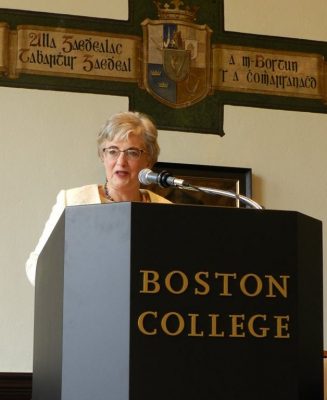
By Cian Molloy - 04 November, 2018

Mimnster for Children and Young People Katherine Zappone speaking at her alma mater.
There is hope for a bright future for the Church, despite suffering a “dark night of the soul”, according to Bishop Brendan Leahy of Limerick.
Bishop Leahy made this observation during an address at the 21st Century Centre at Boston College in Massachusetts.
A few days later, Ireland’s Minister for Children and Youth Affairs, Katherine Zappone, also spoke at Boston College, delivering a keynote speech to a two-day conference on the topic of “Towards transitional justice: recognition, truth-telling and institutional abuse in Ireland.”
Boston College is considered the centre of Irish studies in the United States. It is also a good venue for reflecting on the worldwide scandals of clerical child abuse and hierarchical cover-ups, as it was the Boston Globe newspaper that first brought the extend of clerical child abuse to public attention, not only in the United States but across the globe.
After acknowledging “the abuse of power and conscience” that had occurred in the Church, Bishop Leahy spoke of the importance of acknowledging reality and of “calling things as they are and not hiding or concealing”.
“We need to accept where we are and start again from scratch, making and offering a new discovery of God as love,” he said. “If in the past we didn’t see things through the eyes of injured children and young people, not least those abused by the representatives of the Church, today we undoubtedly have moved a long way in that direction.”
Bishop Leahy’s predecessor, Bishop Donal Murray of Limerick, resigned in 2009 after the Murphy Report found that while he was an auxiliary bishop in the Dublin Archdiocese, Bishop had mishandled clerical child abuse allegations.
Bishop Leahy said the Church has entered a new era. “We are seeing more clearly that certain ways of doing things and practices will have to die.
“Church life revolved somewhat passively around the priest. But as we look to the future, we now see that in the future it will be lay people assisting in funeral liturgies, lay people taking over the running of parishes, lay people exercising pastoral coordinating roles. It’s already in view.
“Child safeguarding has brought an army of very committed lay people into action in our parishes and dioceses at many levels. Religious orders have established trust bodies with lay people involved in governance.
“God is at work, re-generating us as a Church and pointing the way for renewal in the Church in Ireland.
“There is a greater sense of togetherness in mission emerging in this night-time of the Church in Ireland. It’s not enough to do works of charity. We need to be charity or love, as we do them.”
Ms Zappone, who gained a PhD from Boston College’s School of Theology and Ministry in 1986, said that Ireland as a country was beginning to accept the truth about “a dark chapter in our recent history” when institutional abuse of children and vulnerable women was common. “It was a period of incarceration, punishment and ostracisation which led to shame, marginalisation and abuse,” she said. “As a country and a society, we shy away from these truths at our peril.”
She spoke in particular about the discovery of the remains of hundreds of babies and children at a mother and baby home in Tuam. She said these remains will be forensically examined in the hope of both identifying individuals and having their remains buried at a suitable location elsewhere. “Every effort will be made to locate and recover all juvenile remains from the site. It is the very least their loved ones are entitled to.
“However, if we are genuine about confronting the past then we must accept that what happened there is only part of our difficult history. We must recover the truths of people’s experiences in the wider systems of oppression across our country. Failure to do so will mean that we have failed in our shared moral and ethical responsibility for the past,” Ms Zappone said.